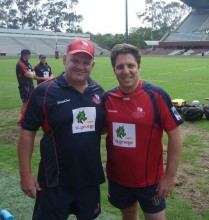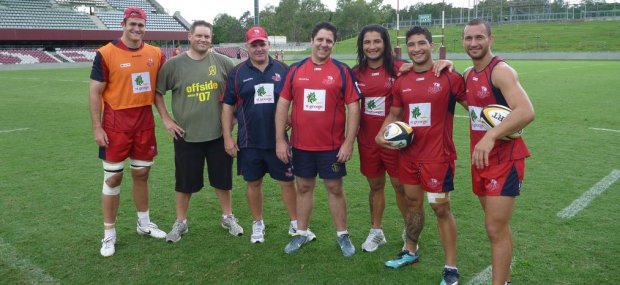With a Super Rugby title under his belt, Ewen ‘Link’ McKenzie is the Aussie coach of the moment. If there’s any one coach who has words put in his mouth on the G&GR forums, it would be him — so we thought it would be great if he could answer some of our forum members’ questions directly, and he kindly obliged. Thanks to ThatGuy for the idea!
Reman – What are the top 3 things you learned at the Tahs, in France then at the Reds? (3 in total)
1. To control the team direction, it’s crucial to have control over the hiring and firing of personnel and be in control of the budget.
2. Politics are inevitable and if you don’t try to understand the organisation’s dynamics, you will come undone. To be successful, it’s not enough to stand on the training paddock or just sit in the coaches box and coach.
3. You must have an interest in managing the influences around your team. Inevitably they will impact on you and the team and vice versa – rather than leave this to chance you need to get involved in the total business. You must also accept that you must find ways to foster the levels below. If everyone took a strong interest in the level below them the game would prosper.

Langthorne – Which players would you bring to the Reds if you could?
I have had a great opportunity to experience European rugby and coach some fantastic players over the years. From this, I’ve developed a great respect for the different playing cultures and have evolved my thinking about the game beyond the technical aspects to include the emotional and psychological elements.
Rather than nominate individuals, I would suggest that if you could collect players from the likes of Munster, Toulouse, Leicester, Leinster and Stade Français you could have a brilliant European team, an impregnable culture and a game for all occasions. There are too many players I like, but I favour a balance of tough players and thinkers. I am also big on consistency.
Ignoto – What runs through your head when deciding when to make substitutions in a game? Are they pre-planned or do you make a decision as it plays out in front of you?
When I worked with Eddie Jones we always had a specific replacement plan. While not as concrete, I still have a rough plan as this flows on from the selection process and the strategy of starting the game and finishing it strong.
I have found that often the chaotic nature of the game does not allow for a plan to eventuate although I still have solid thoughts about injecting impact players from half-time onwards.
I also believe the bench has a very specific job of improving the team. If they are successful in doing so then they deserve more time on the field and eventually a spot in the starting XV. At the Reds, players understand the opportunity that exists by being an effective finisher.
Sully – What, if any, changes do you think there need to be to improve the scrum situation? Could different jerseys for props help with binding?
I’m not sure how many people have sent me tweets on this topic but it’s a lot. With replays of old World Cup matches being broadcast, most people are amazed at how simple scrums were in the old days and the lack of collapses. I am of the belief that we need to turn the clock back and morph the scrum engagement to limit the need for referee involvement.
The tighter jerseys are also an issue. If you remember, Tony Daly used to cut off his sleeve to stop Jeff Probyn pulling him down. A tight-fitting jersey has the same issues and non-binding penalties are a cheap way to lose a match.
Pauly – Do you think another level of competition between Premier Rugby and Super Rugby is needed to better develop players?
I was a big supporter of the ARC competition and spent countless hours setting up the three teams in New South Wales. I was in favour of it running another year as I found the support was good in terms of crowds and it had a 96% approval rating with the players. The problem was some teams dropped the ball, blew their budget and didn’t take it seriously.
Developing another tier is complicated politically but unless we develop something in this space, our middle tier players are going to leave prematurely and we won’t get the development of players as we should.
Self-interest tends to dominate in Australian rugby and that is because it’s such a tough business. I’ve learned, particularly during my time in Queensland, that you must consciously make decisions that better our game. If I just did things for the Reds then I believe the rugby code would never be more than third or even fourth on the sports pecking order.
Slydare – How involved are your playmakers and leadership group in creating plays and strategies? Do they need to ‘own’ the strategy to execute it properly?
We don’t have a leadership group at the Reds as other teams do. I’ve had them in the past but now prefer to deal with a range of players based on their leadership merits. We offer different opportunities for players to contribute, in a range of things, dependent upon their strengths and willingness to be involved.
The strategic part of each week is critically important and all our key guys are involved although it’s up to the coaches to pull it all together. The Reds have been very good at creating, practising and executing their gameplans.
In terms of the non-rugby stuff, there is a simple conduit through the captain but other players as required. It has worked very well and the players within the squad have been extremely trusting and committed.
Scarfman – Is Quade’s defence a strategic problem for you? Is it something you are trying to improve or have you accepted it as a given?
Quade improved his tackle success percentage by 25% this season so there is no doubt he has improved. We have a strategic approach to everything we do, and how we use Quade, and other players, varies. We have a lot of players who excel at certain elements of the game so fundamentally my aim is to have players playing to their strengths while working on their weaknesses.
Twenty Seven – How do you think the salary cap is going to affect the Reds?
At the Reds we are very prudent in our recruiting and have spent far less than the other provinces, so we are actually in a better position than anyone else as far as our cap standing. I spend a lot of time on this aspect of the business as it ties into the playing side of the business and also the affordability.
In the past we have been recruiting from our Academy and cherry-picking experienced players like Radike Samo, Adam Wallace-Harrison and Beau Robinson. The mix works well. We only lost two of our younger players to poaching for 2012 but we also understand that the more successful you are, the more expensive your players become.
Bringing younger players in will always be part of the solution but there will also be hard decisions to make which cannot be avoided. Guys like Chris F’Sautia are examples of continuing to bring through the next star players.
Hawko – How will the Extended Playing Squad work, for example, with swapping EPS players between provinces when needed?
The EPS players will not be swapped unless there was a mutual agreement between provinces. The National Academy players are open to everyone, but the CPS and EPS are the provinces’ for the season.
With the setup of the EPS, and in accordance with the IRB, if a player is selected and plays in a competition for one team, then he cannot play for another team in the same competition during the same year. Effectively, each squad has 35 players dedicated to the task of playing the Super Rugby season.
Ruggo – What actually goes into making selections? How do you weigh individual skills against what a player might bring to the team environment?
There is recruitment and selections, and while these tie in together, they are also different. I concentrate on getting players with good skills but they also must have a good work ethic and the right type of personality to complement the group. If the player possesses the latter two, skills can be developed and improved upon anyway. It’s hard to change personality and, while you can change some of their behaviours, it does take time. You must recruit well if you want to gain momentum and see a result quickly.
Choosing players takes time and you need to get in front of them and do your checking. You need check to see if the player has been allowed by circumstance or playing style to play their best. This is the most important part of the work – get the right people and I believe it is a skill to recruit well.
Selections revolve around tactics, performance, injury status, welfare, internal competition and motivation. All of these aspects are in play when we discuss team selections. When you add ideas around starting and finishing games, there’s a lot to discuss despite many people thinking selection is automatic. It’s important to continue thinking selections through. We prefer to make our selections early to maximise training efforts and have gone better by not waiting for injuries but rather backing the next player to step up.


